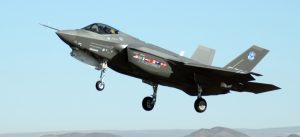Congress often takes a haphazard approach to foreign policy, but the Senate effort to deny F-35s to Turkey is the right move. Continuing to deliver America’s most advanced fighters to Ankara will do greater harm than good to U.S. interests — and that should give NATO pause.
Though the original intention was to strengthen the military capacity of an important ally, the planned sale of 100 of the jets to Turkey will only strengthen an increasingly autocratic regime. Turkish President Recep Tayyip Erdogan has spent the two years since an attempted coup imprisoning tens of thousands of political opponents, muzzling the press, and expanding the scope of his own powers, culminating in his “reelection” and the elimination of any meaningful limits on how long he may retain his position. The European Union has already recognized the danger, hitting the brakes on talks about Turkey’s long-desired accession to the EU as Erdogan cracks down on political opponents.
The United States and its other NATO allies should also be rethinking whether it makes sense for Turkey to remain a part of the alliance. Turkey’s dramatic backsliding towards authoritarianism and its recent foreign policy moves raise serious questions about its trustworthiness and suitability as an ally. Retired U.S. Air Force Lt. Gen. Tome Walters pointed out that in the wake of Erdogan’s crackdowns, “Most of the leaders I dealt with in Turkey are in prison right now.” Strengthening the Erdogan regime by selling it fighters is precisely the wrong response to Turkey’s violation of democratic norms and also risks emboldening Turkey’s already nationalist foreign policy.
Expelling Turkey from NATO is not a decision to be taken lightly. Not only has Turkey been an integral member of the alliance since joining in 1952, but given its location, analysts have long viewed Turkey as a strategically critical member of the NATO alliance. Turkey helps defend Europe’s southern flank and its bases have routinely provided the staging area for air strikes in Afghanistan, the humanitarian crisis in Kashmir, as well as anti-ISIS combat in Syria.
Moreover, both the military and political tasks of disentangling Turkey from NATO would be complex. Though it is difficult to know exactly how Turkey’s behavior would change, it is not hard to predict that European and American relations with Turkey would deteriorate. In the worst case, Turkey would tilt further toward Russia.
Given all this, many acknowledge Turkey’s recent troubles while arguing that the sale of 100 F-35s should go through. Sen. Ted Cruz, for example, opposes the effort by Sens. James Lankford, Jeanne Shaheen, and Thom Tillis to obstruct the sale, arguing that Turkey is a vital contributor to NATO and that the U.S. should not deny it security benefits.
The reality, however, is that Turkey has already been moving closer to Russia while increasingly working at cross-purposes to NATO and the U.S. The most obvious evidence of this is in Syria. While the United States sees the Syrian Kurdish militias as an important ally in the fight against the Islamic State, Erdogan sees an existential threat to Turkish security. As a result, Ankara has been working with Moscow to fight the very rebels the United States has been backing. Turkey has also ordered a Russian missile defense system despite stern warnings from the State Department.
Snce the Arab Spring, moreover, Turkey has given support to Islamist groups throughout the Middle East. For example, the government has sent Imams to Africa to support a radical version of Islam, and supports Boko Haram, an Islamic State affiliate, in Nigeria. Selling weapons to Turkey just gives Erdogan better tools for thwarting American goals and risks fueling further regional instability and terrorism.
A final argument against selling F-35s to Turkey stems from Turkey’s political instability. Though Erdogan escaped from the 2016 coup attempt and has since consolidated power, Turkey remains a powder keg. The State Department has raised its warning level about travel there. Worse, it has forecast a chance of greater instability down the road, raising the possibility that Turkey’s military facilities – which hold hundreds of tanks and fighter planes and American nuclear weapons at the Incirlik military base – could fall into the hands of groups even less appealing to the United States.
In the end, an increasingly authoritarian and politically fragile ally that cozies up to Russia, works against the U.S. war on terror, and spreads extremist forms of Islam is not much of an ally. Turkey today certainly does not act like an ally that Americans would be willing to fight and die for as required by Article 5 of the NATO charter. And Turkey is certainly not an ally that deserves the highest level of access to advanced American weaponry.
Source: defenseone
Ask me anything
Explore related questions





